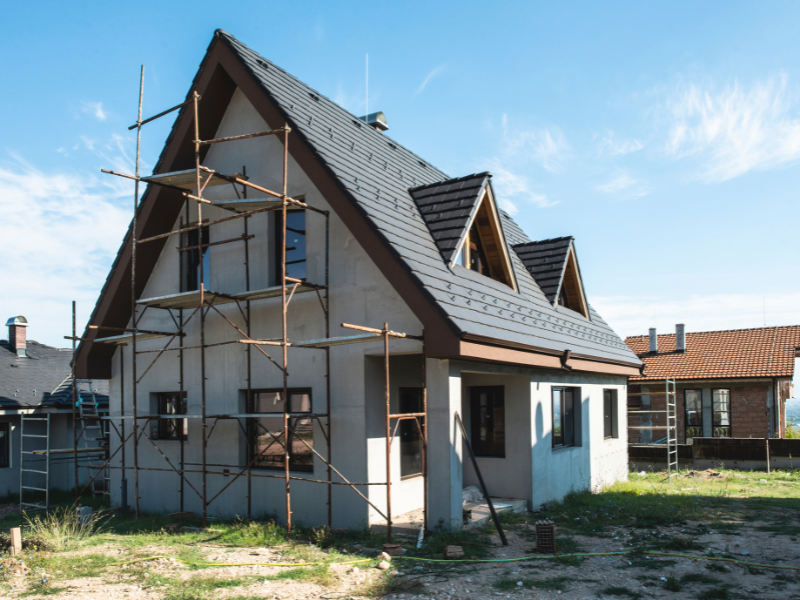Published on May 17th, 2023
What is the new legislation being introduced for landlords around improving EPCs?
New government legislation around energy performing certificates (EPC) means that landlords must prioritise improving the energy efficiency of their homes to avoid facing significant fines.

The UK Government has committed to a target of net-zero by 2050. In order to reach this target, the UK has almost 29 million homes that require retrofitting by 2050 - that’s a staggering 1.8 homes per minute between now and then. In keeping with this, they have recently stated that by 2025 all newly-rented properties must have been awarded with an EPC of C or above. They’ve also announced new alterations to Minimum Energy Efficiency Standards (MEES) exemptions.
It’s becoming increasingly difficult for landlords to navigate retrofitting their homes amidst these changes in legislation. Below, we’ve outlined the key changes to legislations and their respective timelines that landlords need to be aware of. As well as how you can enlist Furbnow to support you in your journey to reach the best energy efficiency levels possible for your home in the most cost-effective way.
If you’re looking for advice on how to make your properties more energy efficient you can book a home assessment with us, where an accredited surveyor will tell you exactly where your property can be improved and provide you with a plan on how to take the property forward and make it more energy efficient. You can book an assessment here.
Contents:
- What is the new legislation?
- What do you (the landlord) need to do?
- How can Furbnow help you?
1. What is the new legislation?
Changes to EPC legislation
In a bid to reach net zero by 2050 and increase the energy efficiency of homes, the Government has announced new legislation to improve EPCs for homeowners living in England and Wales. These certificates show the energy efficiency and CO2 emissions of your property. Their grading system ranges from ‘G’ (awarded to the least energy efficient homes) up to ‘A’ (awarded to best performing homes).
Currently, in order to let your property, it must have got a valid EPC rating of E or above. However, the new legislation states that by 2025 all newly-rented properties must have been awarded an EPC of C or above. There is also potential for further increased targets to follow every few years. These new regulations will apply to new tenancies first, before relating to all tenancies from 2028.
Changes to MEES exemptions
MEES (Minimum Energy Efficiency Standards) were originally introduced in 2015 to improve the quality and energy efficiency of the worst performing privately rented properties. However, the exemptions set in 2018 are due to expire at the end of this year. Properties that qualify for exemptions included listed or protected buildings, temporary properties and those that are due to be demolished.
This means that landlords whose properties were exempt from making upgrades in 2018 will now either need to reapply for exemptions or carry out work at the end of this year to ensure their property complies with the MEES. Exemptions have been proposed where costs required to meet the standard are in excess of £10,000.
2. What do you (the landlord) need to do?
Obtain an up-to-date EPC
As a landlord, it’s your responsibility to ensure that your property has an EPC that meets the latest MEES criteria. Your tenants are also entitled to a copy of your home’s certificate and need to be provided with one when moving in. For those with older certificates, we recommend getting them renewed in order to make sure they are up to current standards.
In order to get an EPC, an energy assessment survey must be conducted. You need to give your tenants a minimum of 24 hours written notice of a visit from an assessor. The assessment will focus on the following areas within your home:
1. Windows
2. Roofs, walls and insulation
3. Lighting
4. Boilers and heating systems
5. Renewable energy devices e.g. solar panels
6. Fireplaces
7. Building dimensions and age
Penalty charges
As it now stands, the penalty for homeowners who don’t have a valid EPC is £5,000. From 2025, this will have increased six-fold to £30,000. Once you have one, an EPC is valid for 10 years. A new one is only needed when you’re setting up a new tenancy agreement or if you’re selling your property.
3. How can Furbnow help you?
Embarking on retrofitting your home to make it more energy efficient can be incredibly daunting. It’s difficult to decide what project to tackle first, know which services are reliable and who is charging a fair price. That’s without touching on the many planning requirements that can make retrofitting your home seem all too complicated.
Furbnow is your companion throughout the entire retrofit journey, with the aim of making it as painless as possible. Not only can you enlist us to assess your properties and create a detailed plan of what to improve, we can also organise and project manage the work for you. Driven by giving impartial and actionable advice, we help you carry out the work your home actually needs in the most efficient way possible.
Home Energy Assessment
Our Home Energy Assessment is the first step you can take as a landlord towards making your home more energy efficient. It starts with an accredited retrofit assessor inspecting your property, identifying the current performance of your home and how best it can be improved. They then draft a customised home energy plan. This is detailed with fully costed recommendations and a clear action plan outlining the next steps to be taken that best align with your budget.
Retrofit Project
Following the assessment, we’re here to assist in your retrofit project in whichever way best suits you. Whether this be organising all the contractors and project managing energy efficiency installations, or purely acting as your advisor, our aim is to make this process as straightforward as possible for landlords.
Monitoring Performance and Aftercare
Once our retrofit changes have been installed, we use smart meter data, air quality, and temperature sensors to monitor the effectiveness of retrofit improvements made throughout your home. By using this technology, we can track your return on investment through the energy and emission reductions.
If you’re looking for advice on how to make your properties more energy efficient you can book a home assessment with us, where an accredited surveyor will tell you exactly where your property can be improved and provide you with a plan on how to take the property forward and make it more energy efficient. You can book an assessment here.
Written by

Oisin Teevan